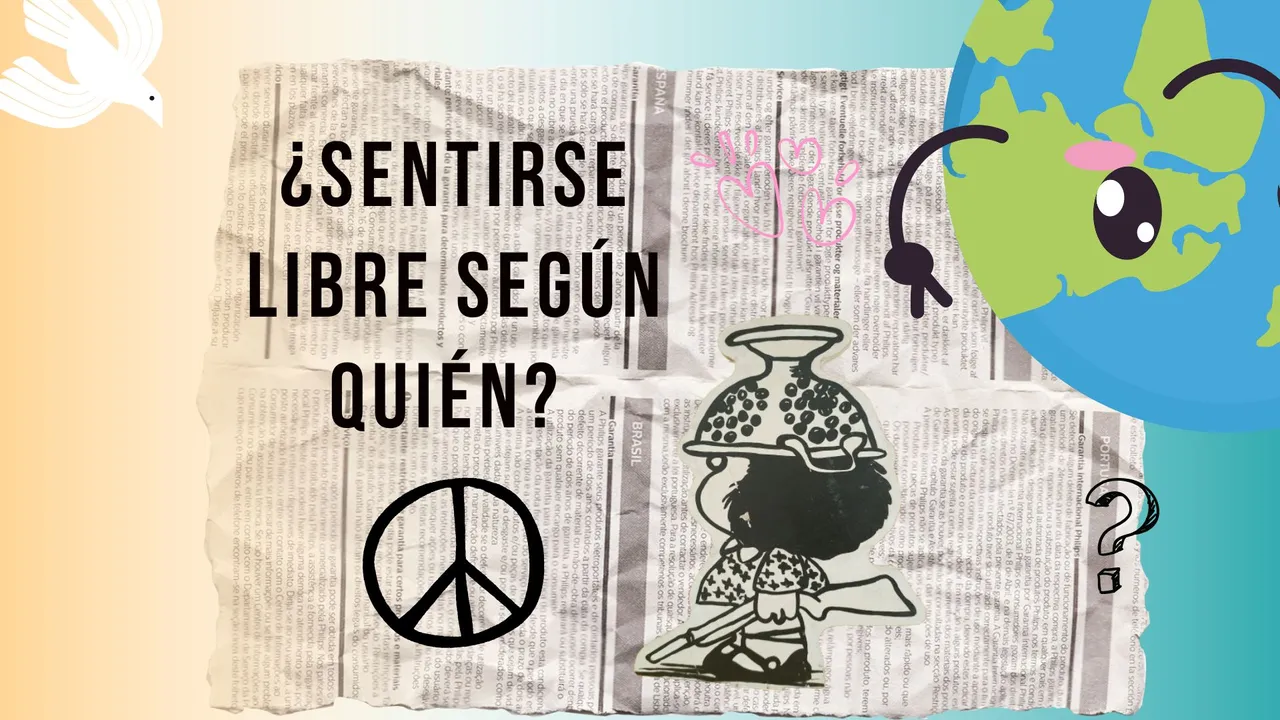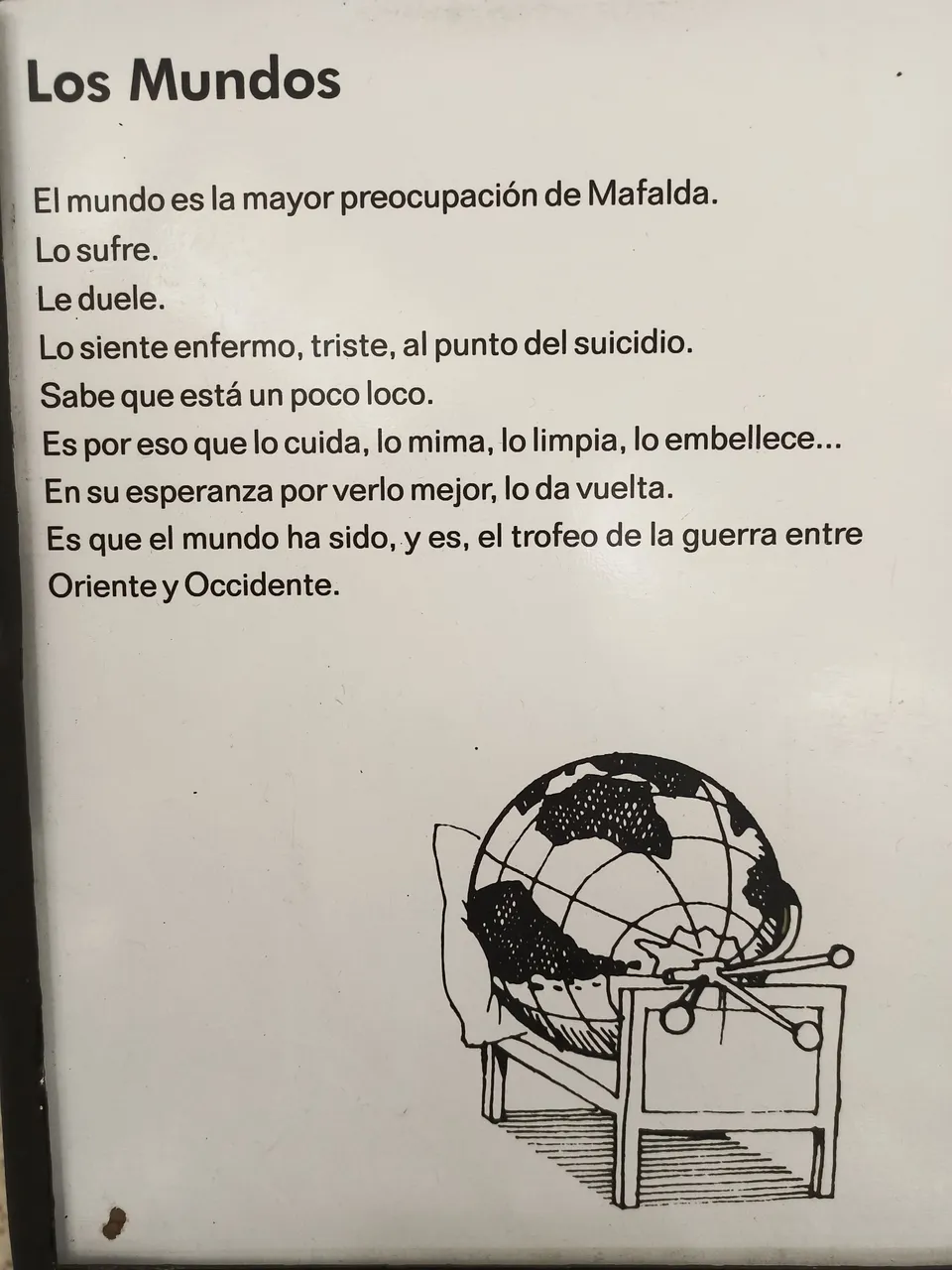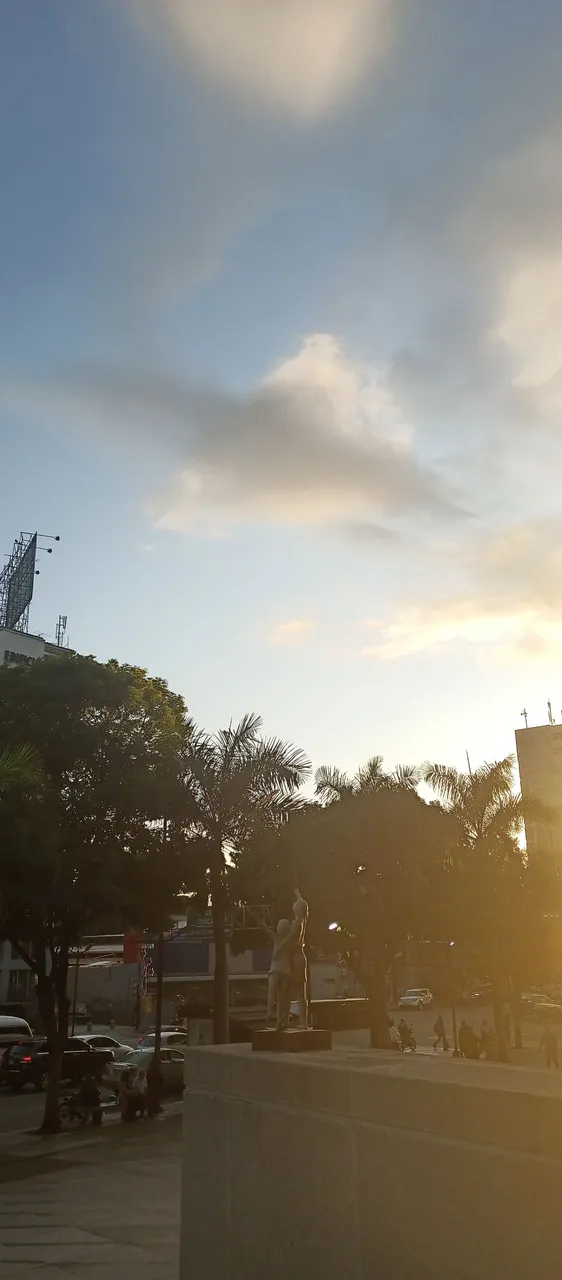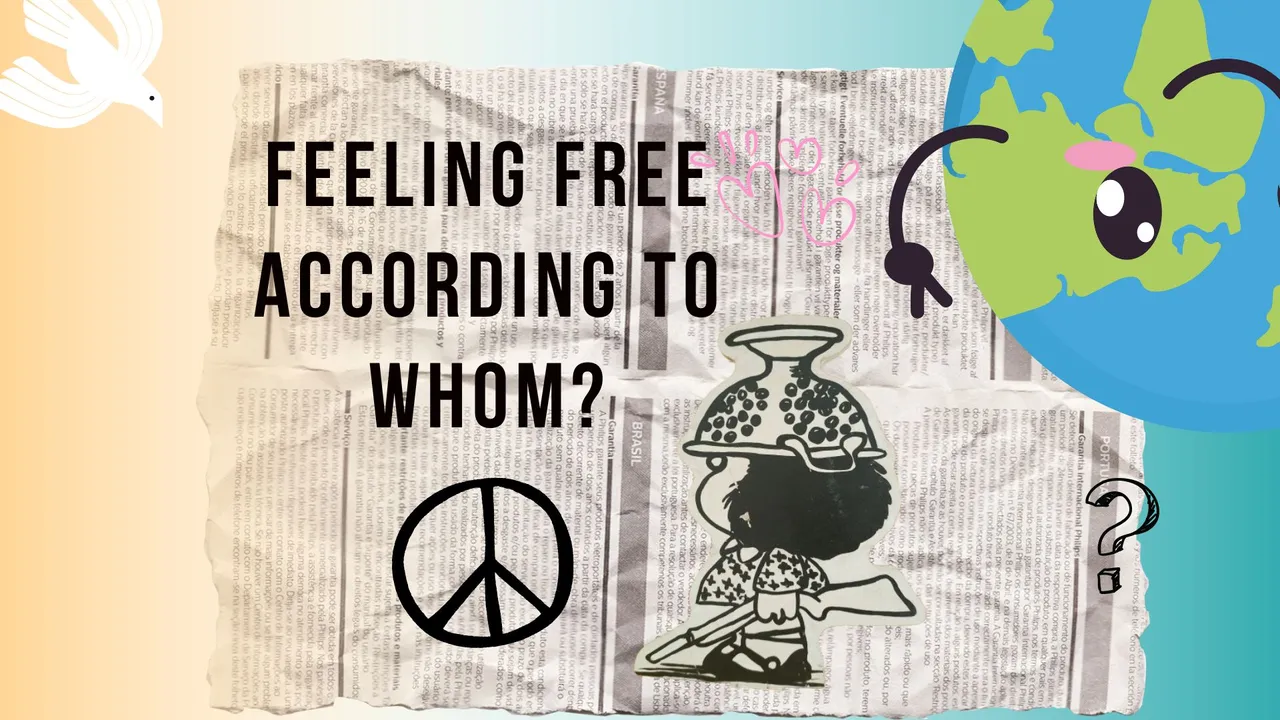ESPAÑOL

Own cover
"El buen hijo (hija) siempre vuelve a su hogar", dice el popular refrán venezolano y de uso en la cultura de los países hispanos. Aquí estoy de regreso a la comunidad de Humanitas después de mucho tiempo, pido disculpas por tanto tiempo de ausencia.
Este refrán con el abro mi reflexión, se refiere a esa idea de que, no importa cuántos nos alejemos, siempre regresamos al origen, al lugar donde todo comenzó. La libertad de elegir, es algo que me encanta de Hive, y de eso consiste el post de hoy.
La comunidad Humanitas es un hogar que nos recibirá para la disertación y la reflexión, por eso antes de que puedas adentrarte en el texto que propongo, te invito a revisar el calendario que ha preparado la comunidad para este mes aquí y así puedas aventurar y elegir un día temático. Para el día de hoy 4 de julio me encontré con este tema:
¿Qué significa ser verdaderamente libres?
Silencio y suspiro profundo... No quiero complicarme con teorías o definiciones sobre la libertad, en cambio compartiré anécdotas y pensamientos cercanos de algunas personas que admiro y cerraré con mis aportes. Haré el esfuerzo por explicar la idea de sentirse libre, conecto con un recuerdo de mis días universitarios, cuando el profesor de Cultura y Desarrollo Humano (fue mi materia preferida en la universidad) le preguntó a un alumno:
-"¿Cuándo te sientes libre?"
Este respondió: "Cuando estoy sentado en el trono" (se refería a la poceta, inodoro, retrete o váter), es decir a la intimidad de estar sentado en el baño de su casa.
-El profesor respondió contundente:
"ese objeto es ideado y pensado para ser usado de un modo y no de otro, se le atribuyen diversos sentidos a la idea de un sanitario que fue creado por otra persona, una práctica que ha ido evolucionando, lo adaptaste y tu lo tomaste como tu idea de libertad".
Esto es, en resumen, lo que recuerdo de aquella reflexión. El profesor explicaba cómo incluso en aquellas cosas o situaciones cotidianas que consideramos como nuestra libertad, hay imposiciones implícitas que han modificado de cierta manera nuestras costumbres a lo largo de la historia.
La libertad tiene tantos conceptos como quizás estrellas hay en el universo, tal vez por eso existen tantas confrontaciones y diferencias en el mundo, porque al final, cada persona quiere defender su propia idea de libertad. Para Amartya Sen, el Desarrollo Humano exalta esa propuesta de que las personas deberían poder "vivir la vida que valoran", sin embargo, existen condiciones externas que a menudo interrumpen esta posibilidad de elegir. La falta de garantías suficientes para sus derechos humanos, la ausencia de oportunidades económicas, educativas o laborales, son hechos irrefutables. Las condiciones históricas y actuales del mundo afectan directamente nuestras vidas cotidianas y en consecuencia, limitan nuestra capacidad de vivir una vida más plena con posibilidad de elegir.

Foto propia: exposición de Mafalda en Caracas
¿Libertad para quién?
Entonces, ¿"ser verdaderamente libres”, depende solo de situaciones externas o reside en la capacidad de decisión y el "libre albedrío" solamente?. Recientemente, conversaba con alguien y me compartió su visión, muy religiosa, cree en la libertad como "esa posibilidad de elegir con la plenitud del espíritu", para trascender toda pesadumbre humana y social. Para esa persona el espíritu puede ser lo que para ti o para mí es la capacidad de decidir con creatividad sobre aquellas cosas que nos gustan, nos dan confort y paz. ¿Pero bajo qué condiciones puedo elegir, qué tipo de libertad y libertad para quién?. Pienso que las decisiones dependen de la condición, territorios, situación social, así que cada quien elige desde su comodidad, ventaja y oportunidad... ahora imaginemos a quienes no cuentan con casi nada o nada.
Me resulta casi imposible hablar de mi propia libertad cuando hay tanto pesar en el mundo, en este mundo de redes sociales se sobrevalora mucho el enfoque individual que van en tendencia al narcisismo en casos extremos. No es malo darse prioridad como persona y esa idea de libertad, pero necesitamos entender que si no nos reconocemos también en el valor de nuestra conexión y colaboración con el entorno, el mundo seguirá siendo un planeta indiferente y proclive a morir. Bauman dice: “Necesitamos sustituir tanta independencia por una interdependencia placentera”. Si lo llevamos a escala mundial en un contexto de guerra, ¿quién le da la libertad a una nación de atacar a otra y quien la condena?, en su afán de libertad independiente, afecta la convivencia planetaria, por ejemplo.
Mi idea de libertad:
Aun con todo este preámbulo, haré la tarea de expresar cuando me siento libre, honestamente solo a veces, no todo el tiempo, aun soy presa de ideas, prácticas de vidas, influencias que busco des-influenciar, aprendizajes que estoy desaprendiendo, comparaciones y decisiones innecesarias, me despojo frecuente de situaciones limitativas. Para sentirse libre no es llegar a una cima con tope final, es un ciclo de procesos en construcción, de los que se enfrentan tantos desafíos que a veces incluso no dependen de mí, pero de aquellos de los que si tengo control, son los que busco cuidar.
Cuando me siento libre, es cuando tengo la posibilidad de elegir diariamente una vida sostenible en conexión con el contexto, sentirme libre es mantenerme despierta y consciente al mundo con una mirada y filtro crítico, porque sé que muchas veces suelo contradecirme y espero darme cuenta de eso siempre a tiempo, para dar giros y hacer los ajustes necesarios. Hago todo lo posible por elegir una forma de libertad capaz de errar sin causar daño en mi accionar, si lo hago, disculpa. Busco constantemente una vida de aprendizajes y superar mis propios límites. Me siento libre durmiendo la noche con paz mental, me siento libre cuando elijo con conciencia lo que va a mi plato de comida, cuando elijo amar cada día, cuando elijo trabajar en pro de otras personas, me siento libre escribiendo, me siento libre ayudando, me siento libre cuidándome y cuidando.
La idea de libertad es subjetiva, depende de quién, de dónde y cuándo... lo más importante es que la libertad sea una forma de vivir donde el fin último sea el bien común.

Foto propia: frente de Parque Crital, Monumento al Niño y la Niña de Teresa Cabello.
ENGLISH

“The good son (daughter) always returns home”, says the popular Venezuelan proverb and of use in the culture of Hispanic countries. Here I am back to the Humanitas community after a long time, I apologize for such a long absence.
This saying with which I open my reflection, refers to the idea that, no matter how far we go, we always return to the origin, to the place where it all began. The freedom to choose is something I love about Hive, and that is what today's post is about.
The Humanitas community is a home that will welcome us for dissertation and reflection, so before you can delve into the text I propose, I invite you to review the calendar that the community has prepared for this month here and so you can venture and choose a thematic day. For today's 4th of July I came across this theme:
What does it mean to be truly free?
Silence and a deep sigh... I don't want to complicate myself with theories or definitions about freedom, instead I will share anecdotes and close thoughts of some people I admire and close with my contributions. I will make the effort to explain the idea of feeling free connect me with a memory from my college days, when the professor of Culture and Human Development (it was my favorite subject in college) asked a student:
-"When do you feel free?"
He replied, "When I'm sitting on the throne" (he was referring to the potty, toilet, commode or lavatory), i.e. the intimacy of sitting in the bathroom at home.
-The professor answered bluntly:
"that object is devised and thought to be used in one way and not another, various meanings are attributed to the idea of a toilet that was created by someone else, a practice that has evolved, you adapted it and you took it as your idea of freedom".
This is, in a nutshell, what I remember from that reflection. The professor was explaining how even in those everyday things or situations that we consider as our freedom, there are implicit impositions that have modified our customs in a certain way throughout history.
Freedom has as many concepts as there are stars in the universe, perhaps that is why there are so many confrontations and differences in the world, because in the end, each person wants to defend his or her own idea of freedom. For Amartya Sen, Human Development exalts this proposal that people should be able to “live the life they value”, however, there are external conditions that often interrupt this possibility of choice. The lack of sufficient guarantees for their human rights, the absence of economic, educational or employment opportunities, are irrefutable facts. The historical and current conditions of the world directly affect our daily lives and consequently limit our ability to live a fuller life of choice.

Own photo: Mafalda's exhibition in Caracas
Freedom for whom?
So, does “being truly free” depend only on external situations or does it reside in the capacity of decision and “free will” alone? Recently, I was talking to someone and he shared with me his vision, very religious, he believes in freedom as “that possibility to choose with the fullness of the spirit”, to transcend all human and social heaviness. For that person the spirit can be what for you or for me is the ability to decide with creativity about those things that we like, that give us comfort and peace. But under what conditions can I choose, what kind of freedom and freedom for whom? I think that decisions depend on the condition, territories, social situation. so everyone chooses from their comfort, advantage and opportunity, now imagine those who have nothing.
It is impossible for me to talk about my own freedom when there is so much regret in the world, in this world of social networks the individual approach is overvalued and tends to narcissism in extreme cases. It is not a bad thing to give ourselves priority as a person and that idea of freedom, but we need to understand that if we do not also recognize the value of our connection and collaboration with the environment, the world will remain an indifferent planet and prone to die, Bauman says: “We need to replace so much independence by a pleasant interdependence”. If we take it to a global scale in a context of war, who gives the freedom to one nation to attack another and who condemns it, in its eagerness for independent freedom affects planetary coexistence, for example.
My idea of freedom:
Even with all this preamble, I will do the task of expressing when I feel free, honestly only sometimes, not all the time, I am still prey to ideas, practices of lives, influences that I seek to un-influence, learnings that I am unlearning, unnecessary comparisons and decisions, I frequently shed limiting situations. To feel free is not to reach a summit with an end stop, it is a cycle of processes under construction, of which face so many challenges that sometimes do not even depend on me, but those that I do have control over, are the ones I seek to take care of.
When I feel free, is when I have the possibility to choose daily a sustainable life in connection with the context, to feel free is to keep me awake and aware to the world with a critical look and filter, because I know that many times I often contradict myself and I hope to realize that always in time to make the necessary adjustments. I do my best to choose a form of freedom capable of erring without causing harm in my actions, and if I do, I apologize. I constantly seek a life of learning and overcoming my own limits. I feel free sleeping at night with peace of mind, I feel free when I consciously choose what goes on my plate of food, when I choose to love every day, when I choose to work for other people, I feel free writing, I feel free helping, I feel free taking care of myself and taking care of others.
The idea of freedom is subjective, it depends on who, where and when... the most important thing is that freedom is a way of living where the ultimate goal is the common good.

Own photo: in front of Parque Crital, Monumento al Niño y la Niña by Teresa Cabello.
Translated: DeepL
OWN IMAGES